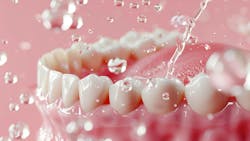In brief: The future of fluoride, alcohol-related fatalities, and COVID-19's impact on dental prescriptions
Trump administration plans to remove fluoride from US drinking water
Although Donald Trump has yet to take office for his upcoming term, he may be endangering the mouths of millions of Americans starting next year.
Last Thursday, Trump nominated Robert F. Kennedy, Jr. as his Secretary of Health and Human Services, who noted earlier this month that the Trump administration will advise "all US water systems to remove fluoride from public water."1
Despite the Centers for Disease Control and Prevention (CDC) advocating for the inclusion of fluoride in drinking water, RFK Jr. believes it's responsible for arthritis, bone damage, thyroid disease, and neurological issues-according to a recent post on X.1
This decision has received a considerable amount of backlash from public officials and oral health experts. Republican Representative and former dentist Mike Simpson says this plan will "be good for the dental profession," because it will lead to "a lot more cavities to fill."1 Another former dentist, Texas GOP Representative Brian Babin, also disagrees with this plan.
Pediatrician Annie Andrews said, "If we remove fluoride from the water as RFK Jr. plans to do, the number of children who have serious dental infections is going to skyrocket."1
As of right now, the future of Americans' teeth is undecided.
Alcohol-related deaths in the US have almost doubled since 1999
A new study from Florida Atlantic University's Schmidt College of Medicine revealed that the number of US alcohol-related deaths has almost doubled over the past two decades (10.7 per 100,000 in 1999 to 21.6 per 100,000 in 2020). Although mortality rates rose in every age demographic, the most alarming surge-nearly fourfold-was in those aged 25 to 34.2
According to Newswise, "Both men and women experienced significant increases in alcohol-related deaths, but men had the highest rates in both years and saw the steepest increase overall. Women, however, saw the largest proportional rise, with deaths increasing from 4.8 per 100,000 in 1999 to 12 in 2020."2
Deaths from alcohol overconsumption are only further complicated by conditions like obesity, diabetes, cardiovascular disease-particularly heart attacks and strokes-and liver damage. All health-care providers must be aware of the risk factors involved to prevent unnecessary deaths; screening for alcohol use in primary care settings, for example, is one way to do this.
How COVID-19 impacted antibiotic distribution in dentistry
A new study by Evidence Based Dentistry (EBD) retrospectively examined the effects that the COVID-19 pandemic had on dental antibiotic prescriptions. From 2019 to 2021, the Wits Oral Health Centre collected and analyzed patient data to determine whether the number of prescriptions doled by dentists increased during the pandemic.3
Overwhelmingly, the "pre-COVID-19" prescriptions (March 2019 to March 2020) were significantly lower than those from the "COVID-19" period (March 2020 to March 2021). The number of prescriptions recorded before the pandemic was 1,109, but this number steadily rose to 1,571 during the "COVID-19" period of the study. Amoxicillin and metronidazole were prescribed the most during this time, with the combination of these two increasing from 16.6% to 24.4% over the two-year study period.3
References
-
King J. Dentists respond to RFK Jr's appointment: 'lot more cavities to fill'. Newsweek. November 2024. https://www.newsweek.com/dentists-respond-rfk-jrs-appointment-fluoride-drinking-water-1986502
-
Florida Atlantic University. Alcohol-related deaths in the US more than double from 1999 to 2020. Newswise. November 2024. https://www.newswise.com/articles/alcohol-related-deaths-in-the-u-s-more-than-double-from-1999-to-2020/?sc=dwhr&xy=10053556
-
Did the COVID-19 pandemic impact antibiotic prescribing patterns among dentists? Evidence. November 2024. https://www.nature.com/articles/s41432-024-01087-3
About the Author

Sarah Butkovic, MA, BA
Sarah Butkovic, MA, BA, is an Associate Editor at Endeavor Business Media, where she works on creating and editing engaging and informative content for today's leading online dentistry publications. She holds a Master's English Language and Literature from Loyola University Chicago and is passionate about producing high-quality content that educates, inspires, and connects with readers.


